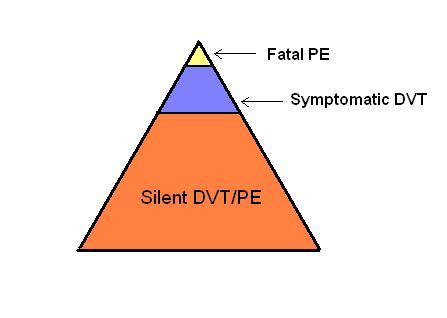Pulmonary embolism epidemiology and demographics
| Resident Survival Guide |
|
Pulmonary Embolism Microchapters |
|
Diagnosis |
|---|
|
Pulmonary Embolism Assessment of Probability of Subsequent VTE and Risk Scores |
|
Treatment |
|
Follow-Up |
|
Special Scenario |
|
Trials |
|
Case Studies |
|
Pulmonary embolism epidemiology and demographics On the Web |
|
Pulmonary embolism epidemiology and demographics in the news |
|
Directions to Hospitals Treating Pulmonary embolism epidemiology and demographics |
|
Risk calculators and risk factors for Pulmonary embolism epidemiology and demographics |
Editor-In-Chief: C. Michael Gibson, M.S., M.D. [1] The APEX Trial Investigators; Associate Editor(s)-in-Chief: Rim Halaby, M.D. [2]
Overview
The precise number of people affected by venous thromboembolism(VTE), that is either deep vein thrombosis, pulmonary embolism (PE), or both, is unknown, but estimates range from 300,000 to 600,000 (1 to 2 per 1,000, and in those over 80 years of age, as high as 1 in 100) each year in the United States. Approximately 5 to 8% of the U.S. population has one of several genetic risk factors, also known as inherited thrombophilias in which a genetic defect can be identified that increases the risk for thrombosis.[1][2]
Epidemiology and Demographics
Incidence
- The precise number of people affected by venous thromboembolism (VTE), that is either deep vein thrombosis (DVT), pulmonary embolism (PE), or both, is unknown, but estimates range from 300,000 to 600,000 (1 to 2 per 1,000, and in those over 80 years of age, as high as 1 in 100) each year in the United States.[1][2]
- In the United States, the annual incidence of VTE is estimated to be approximately 100 per 100,000 persons.[3]
Age
The incidence of VTE increases with age, ranging from < 5 cases per 100,000 people in childhood to 500 cases per 100,000 people in the elderly.[3] Subjects who are more than 65 years of age are at three times higher risk for VTE compared to those who are 45-54 years old.[4]
Gender
Studies about differences in the incidence of VTE by gender have mixed results.[5][6][4][7] In addition, the risk for VTE was reported to consistently increase with age across both genders.[4]
Race
- There is a significant difference in the incidence of VTE as it relates to race. African Americans characteristically have the highest incidence of VTE and Caucasians rank as the second highest incidence of VTE.[3]
- Lower thrombosis incidences in non-Caucasians may be related to a lower prevalence of disorders like Factor V Leiden or Prothrombin 20210A mutation.[8][9]
Percent Distribution of VTE by Subtypes
- As depicted by the figure below, the majority of VTE events is asymptomatic; while some cases present with fatal PE.
- The percentages of the different subtypes of PE are:
- Massive PE: 5-10%
- Submassive PE: 20-25%
- Low-risk PE: ~70%
References
- ↑ 1.0 1.1 CDC- Deep Vein Thrombosis (DVT) / Pulmonary Embolism (PE) — Blood Clot Forming in a Vein
- ↑ 2.0 2.1 Beckman MG, Hooper WC, Critchley SE, Ortel TL (2010). "Venous thromboembolism: a public health concern". Am J Prev Med. 38 (4 Suppl): S495–501. doi:10.1016/j.amepre.2009.12.017. PMID 20331949.
- ↑ 3.0 3.1 3.2 White RH (2003). "The epidemiology of venous thromboembolism". Circulation. 107 (23 Suppl 1): I4–8. doi:10.1161/01.CIR.0000078468.11849.66. PMID 12814979. Unknown parameter
|month=ignored (help) - ↑ 4.0 4.1 4.2 Cushman M, Tsai AW, White RH, Heckbert SR, Rosamond WD, Enright P; et al. (2004). "Deep vein thrombosis and pulmonary embolism in two cohorts: the longitudinal investigation of thromboembolism etiology". Am J Med. 117 (1): 19–25. doi:10.1016/j.amjmed.2004.01.018. PMID 15210384.
- ↑ Silverstein MD, Heit JA, Mohr DN, Petterson TM, O'Fallon WM, Melton LJ (1998). "Trends in the incidence of deep vein thrombosis and pulmonary embolism: a 25-year population-based study". Arch. Intern. Med. 158 (6): 585–93. PMID 9521222. Unknown parameter
|month=ignored (help) - ↑ Kniffin WD, Baron JA, Barrett J, Birkmeyer JD, Anderson FA (1994). "The epidemiology of diagnosed pulmonary embolism and deep venous thrombosis in the elderly". Arch. Intern. Med. 154 (8): 861–6. PMID 8154949. Unknown parameter
|month=ignored (help) - ↑ "Venous Thromboembolism in Adult Hospitalizations — United States, 2007–2009". Retrieved 2012-10-06.
- ↑ Ridker PM, Miletich JP, Hennekens CH, Buring JE (1997). "Ethnic distribution of factor V Leiden in 4047 men and women. Implications for venous thromboembolism screening". JAMA. 277 (16): 1305–7. PMID 9109469.
- ↑ Gregg JP, Yamane AJ, Grody WW (1997). "Prevalence of the factor V-Leiden mutation in four distinct American ethnic populations". Am J Med Genet. 73 (3): 334–6. PMID 9415695.
